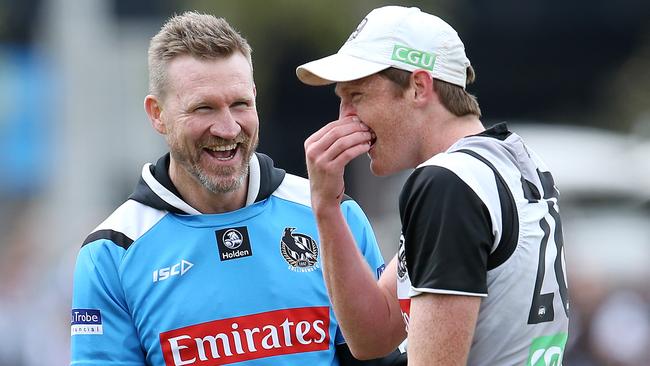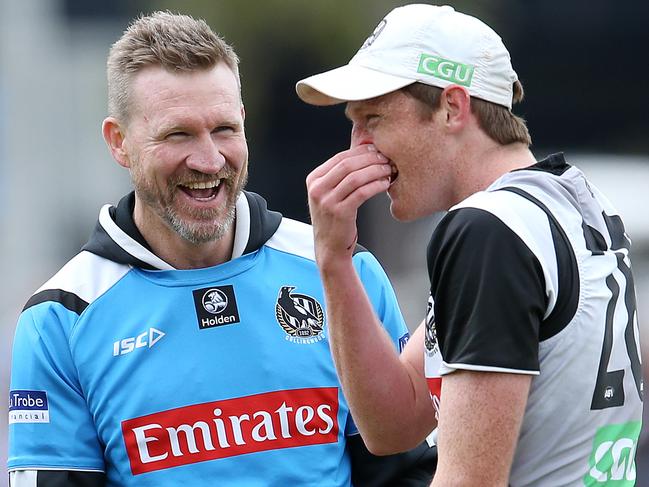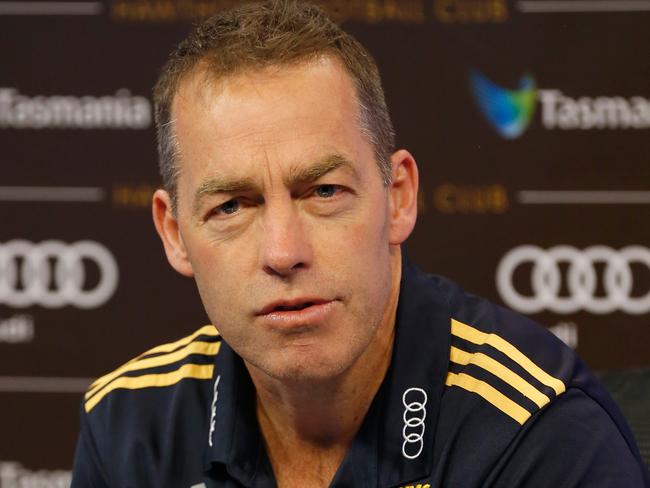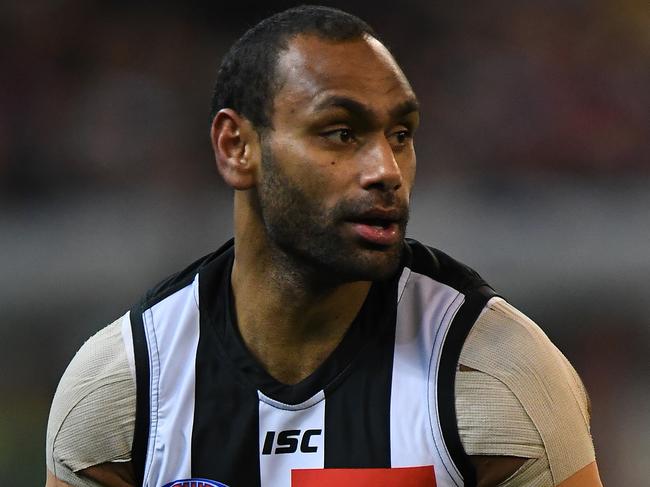Justin Quill: Nathan Buckley and the Magpies. It’s a love thing
COLLINGWOOD’s rise has been marked by a fierce desire to play for each other — and the man who is more than a coach, writes Justin Quill.

Opinion
Don't miss out on the headlines from Opinion. Followed categories will be added to My News.
IF Collingwood wins tomorrow’s Grand Final, we will all hail Nathan Buckley. As we should.
Eddie McGuire has also been crucial. The players are obviously central to the success. But it is Buckley who has been the real key to unlocking Collingwood’s potential.
Yet, it’s not necessarily because Buckley has a brilliant tactical mind. Or a visionary international recruiter with the patience to develop a player like Mason Cox. It won’t even be because of the manic tackling and pressure Collingwood brought to their final against reigning premier Richmond.
COLLINGWOOD BRINGS FUN TO TRAINING
CHANGE IN BUCKLEY HAS INSPIRED COLLINGWOOD
AFL GRAND FINAL 2018 FANS GUIDE
No, the main reason for Buckley’s success and for Collingwood’s success is …. wait for it and stay with me before you turn the page … love.
Buckley’s relationship with his team is different from the sort of relationship we imagine when we think of coach and player, different from the sort of relationship we see in, say, sports movies. Something different is going on down at the Holden Centre. The fire and brimstone yelling seems to have been replaced with a softer approach, less master-servant and more mentor-mentee.
When describing his relationship with Buckley, midfielder Adam Treloar said: “I don’t consider (Bucks) as a coach. My relationship I have with him, and I’m sure all the other players have with him, is a bond, a friendship, a brotherhood.”

A bond. A brotherhood. Now for most people over the age of 30, and certainly for those over 40 and beyond, that seems an unusual, an almost uncomfortable space in which to live.
But Treloar is 25. He’s on the borderline between Gen Y and Gen Z. Most of his teammates are younger. And people that age are refreshingly different. They’re softer, but not in a bad way. They’re just more able to talk about their feelings and express their emotions — and they’re taking us all along for the ride, which I think is a good thing.
I know that from my experience of connecting with the players at my local footy club — Melbourne University Blues — where I’m the runner. I love the boys at the club. It really is a bond. A brotherhood. And it makes a huge difference.
Buckley is simply tapping into what he needs to in order to get the best out of his players. It’s good coaching but you can’t fake it. To develop that sort of deep connection, you have to care. I spoke to one of Buckley’s close mates this week. He said he “has a real sensitive side with a lot of empathy. When he coaches his junior team, he has time for every single kid. You can’t pretend what he does. He just genuinely cares”.
Frankly, that sounds like the perfect skill set to coach players of the age he is coaching at Collingwood. He has developed a bond with them and, in doing so, has got them bonding with each other, and the results are there to see on the field.

AND I think that if you look over recent years, you’ll see the successful coaches have done the same. Consider Damien Hardwick last year and Luke Beveridge in 2016.
But go back 10 years, and you’ll see a different dynamic.
I would argue that Alastair Clarkson won his 2008 premiership with brilliant tactics rather than relationships. That’s not to suggest Clarkson isn’t good with people. Rather, it’s just not the area where he is better than anyone else. But like all master coaches, Clarkson is reinventing himself. It’s no fluke he is a four-time premiership coach. Hawthorn insiders say Clarkson is finding his softer side in recent years and connecting with younger players by showing a level of emotions.
The thought of Clarkson playing guitar and singing a song to laud a player — as he did for Shaun Burgoyne — would seem incomprehensible 10 years ago. But whether he knows it or not, Clarkson seems to have read the tea leaves and is connecting with his players in a more modern way. He’s become more like Hardwick, Beveridge and Buckley than he used to be.
Obviously, this isn’t just an Australian phenomenon. Last year in the US, Clemson University won American football’s college title beating Alabama in the National Championship final. It was a cracker of a game. Afterwards, the winning coach — Dabo Swinney — was asked what the difference was. He replied by explaining what he had told his team at halftime. He said: “I told them … the difference in the game was going to be love. We’re going to win it tonight because we love each other.”

There are so many good stories around the Collingwood team. The development of Mason Cox is one. The possibility of Travis Varcoe winning a flag after the heartbreak of losing his sister to a collision in a football match last month is clearly another.
But it’s Buckley’s story that is the most captivating.
As a Carlton supporter, I can’t quite bring myself to barrack for Collingwood. But if they win, I won’t be too disappointed.
Justin Quill is a media lawyer who represented Australia in kayaking and was a Richmond runner under Damien Hardwick


